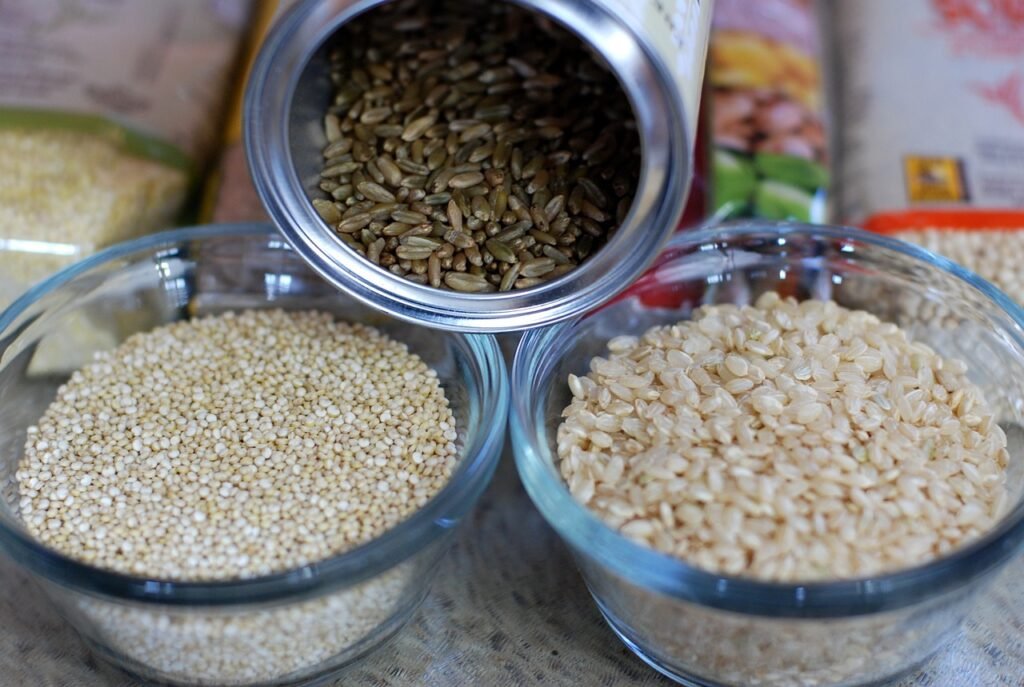
In recent years, the popularity of gluten free meals has soared, with many individuals opting to do without it.
Whether due to gluten intolerance, Celiac disease, or simply a desire to explore new culinary options, gluten free meals have become a staple in many households.
But beyond catering to dietary restrictions, gluten free meals offer a myriad of unexpected benefits that can positively impact your overall health and well-being.
Gluten and Its Impact on the Body
Gluten, a composite of storage proteins present in wheat, barley, and rye, plays a significant role in the texture and chewiness of various baked goods.
However, its presence in the diet isn’t benign for everyone. For a subset of the population, ingesting gluten activates an immune response that can have a profound impact on health and well-being.
This reaction is most severe in those with Celiac disease, an autoimmune condition where gluten damages the small intestine, hindering nutrient absorption and leading to a host of complications.
But the spectrum of gluten sensitivity extends beyond Celiac disease; non-celiac gluten sensitivity can trigger symptoms ranging from abdominal pain and headaches to fatigue and joint pain, albeit without the autoimmune intestinal damage.
The rationale behind reducing or eliminating gluten, even for those without a diagnosed sensitivity, rests on observations of improved health outcomes.
Anecdotal evidence and preliminary research hint at a broader spectrum of individuals who might benefit from a gluten-reduced diet. This includes potential enhancements in digestion and a reduction in inflammatory markers, contributing to an overall sense of well-being.
The dialogue around gluten and its effects has encouraged a more nuanced exploration of diet and its connection to health, pushing the boundaries of traditional dietary recommendations and opening up a space for personalized nutrition strategies.
It’s important to approach this topic with a balanced perspective, recognizing that gluten itself is not inherently harmful to everyone.
The decision to go gluten-free should be informed by a careful consideration of one’s health status, dietary needs, and the potential benefits and challenges that come with such a dietary shift.
This nuanced understanding of gluten and its impact on the body is crucial for anyone considering a transition to a gluten-free lifestyle.
The Link Between Gluten Free Meals and Improved Digestive Health
Embarking on a journey with gluten free meals often leads to a noticeable improvement in digestive health.
This transformation occurs as the body no longer needs to process the complex proteins found in gluten, which for some, can be quite challenging to break down.
When these proteins are absent from the diet, individuals frequently report a marked decrease in digestive issues.
This shift towards easier digestion not only enhances gut health but also paves the way for more efficient absorption of essential nutrients.
By prioritizing gluten free foods, one essentially nudges the digestive system towards a more streamlined and less inflammatory state.
This is particularly beneficial for those who have previously struggled with digestive issues tied to the consumption of gluten-containing grains.
The removal of gluten from the diet is akin to lifting a burden off the digestive tract, allowing it to heal and recover from any inflammation or damage caused by gluten sensitivity or intolerance.
It’s crucial to recognize that this improvement in digestive health is not just about eliminating gluten but also about what replaces it in the diet.
The introduction of a variety of gluten free grains, such as quinoa and rice, alongside an increased intake of fruits, vegetables, and lean proteins, contributes to a more diverse and nutrient-rich diet.

This dietary diversity supports a healthy gut microbiome, further enhancing digestive wellness and resilience against digestive disturbances.
In essence, the journey towards improved digestive health through gluten free meals is a multifaceted one, involving both the removal of potentially harmful elements and the addition of nourishing, gut-friendly foods.
This holistic approach to diet modification can lead to significant improvements in digestive health, setting the stage for a more vibrant and energetically balanced lifestyle.
Enhancing Energy Levels with Gluten Free Meals
When embarking on a gluten free dietary journey, an often unexpected yet delightful benefit is the natural boost in energy levels.
This surge in vitality is largely attributed to the careful selection of ingredients that form the foundation of gluten free cuisine.
By integrating an abundance of whole foods—fruits teeming with vitamins, vegetables rich in minerals, lean proteins for sustained energy, and grains like quinoa and rice that are not only gluten free but packed with nutrients—the body receives a balanced array of essential nutrients.
These components work in synergy to fuel bodily functions optimally.
Furthermore, gluten free meals have a reputation for being lighter on the digestive system. The absence of gluten means the body can process these meals more efficiently, avoiding the sluggishness often experienced after consuming dense, gluten-containing foods.
This efficiency translates into steadier energy levels throughout the day, mitigating the peaks and troughs in energy that can lead to fatigue and decreased productivity.
Another factor contributing to increased energy is the natural reduction in processed foods within a gluten free diet. Processed items, which are frequently high in gluten, tend to be laden with added sugars and fats that can cause a quick spike in energy followed by a precipitous drop.
The shift towards foods in their whole form ensures a more consistent release of energy, providing a stable fuel source that keeps one feeling alert and active.
This dynamic shift towards sustained energy is not just a mere side effect; it’s a testament to the body’s remarkable ability to thrive when nourished with the right foods.
Gluten free meals, with their emphasis on whole, nutrient-rich ingredients, offer a clear path to enhanced vitality and an overall sense of dynamism.
The Role of Gluten Free Meals in Weight Management

Venturing into gluten free meals opens up new avenues for managing weight in a way that aligns with the body’s natural rhythms and nutritional needs.
This approach to eating places a strong emphasis on whole, unprocessed foods, steering clear of the gluten-laden processed options that are often calorie-dense and nutritionally sparse.
By focusing on foods in their most natural state—fruits, vegetables, lean proteins, and gluten free grains such as quinoa and rice—there’s an inherent reduction in the consumption of empty calories.
This, in turn, makes it easier to maintain a caloric balance conducive to weight management.
Moreover, the pivot towards gluten free meals inherently encourages a more mindful approach to eating. When the easy grab-and-go options are off the table, meal planning becomes more deliberate.
This mindfulness can lead to better portion control and a deeper understanding of hunger cues, both of which are crucial for maintaining a healthy weight.
Another facet of gluten free eating that dovetails with weight management is its potential to reduce systemic inflammation.
Chronic inflammation, which can be exacerbated by the consumption of gluten in sensitive individuals, is increasingly recognized as a contributing factor to weight gain and a stubborn obstacle in weight loss efforts.
By eliminating gluten and thereby quelling inflammation, the body is better positioned to regulate its weight.
Transitioning to gluten free meals for weight management is not just about subtracting gluten from the diet; it’s about embracing a holistic dietary pattern that promotes health, balance, and a positive relationship with food.
Through this lens, gluten free meals become not just a dietary preference but a strategic component in nurturing the body’s equilibrium and vitality.
Gluten Free Meals and Their Impact on Mental Health
Delving into the intricate relationship between diet and mental health unveils a fascinating observation: the foods we consume can profoundly influence our mental state and cognitive functions.
This is particularly evident in the context of gluten free meals, where a growing body of evidence suggests a notable shift in mental wellness for individuals sensitive to gluten.
For those with gluten sensitivities or Celiac disease, removing gluten from their diet may lead to an improvement in mood and cognitive clarity. This is not merely about the absence of gluten, but also about the nutritional composition of the foods that typically form a gluten free diet.
Rich in nutrients like omega-3 fatty acids, antioxidants, and B vitamins, gluten free meals support brain health through multiple pathways.
Omega-3 fatty acids, for instance, play a critical role in maintaining the fluidity of cell membranes and are pivotal in brain function and structure.
Similarly, antioxidants help combat oxidative stress, which is linked to mood disorders and cognitive decline. These components collectively foster an environment conducive to mental clarity and emotional balance.
Moreover, the process of adopting a gluten free diet encourages individuals to become more attuned to their bodies and the subtle ways food can affect their mood and energy levels.
This heightened awareness can lead to a more harmonious relationship with food and, by extension, an improved mental state.
While the exploration of gluten’s impact on mental health is ongoing, the current understanding underscores the potential of dietary choices in influencing our psychological well-being, highlighting the profound interconnectedness of diet and mental health.
Navigating the Challenges of a Gluten Free Diet
Embarking on a gluten free diet introduces a unique set of hurdles, from deciphering food labels to finding delectable and satisfying meal options that don’t compromise on taste or convenience.
The initial phase of transitioning can seem daunting, as traditional staples must be swapped out for gluten free alternatives. However, this journey also presents an opportunity to innovate in the kitchen and expand one’s culinary repertoire.

One of the key strategies in overcoming these obstacles is education. Understanding which foods naturally contain gluten and learning to identify hidden sources of gluten in processed foods are essential skills.
This knowledge empowers individuals to make informed choices about the ingredients they incorporate into their meals.
Another aspect of navigating a gluten free diet successfully involves embracing alternative grains and flours.
Staples such as quinoa, buckwheat, and almond flour not only diversify the diet but also introduce an array of flavors and textures that can rejuvenate one’s love for cooking and eating.
Moreover, the advent of social media and the internet has paved the way for a global community of gluten free enthusiasts.
These platforms are treasure troves of tips, recipes, and support for those adjusting to a gluten free lifestyle. Engaging with this community can offer practical advice, from navigating restaurant menus to finding the best gluten free products on the market.
Lastly, the proliferation of gluten free products in supermarkets and the increasing number of restaurants offering gluten free options reflect a growing awareness and accommodation for this dietary need.
This evolving landscape is making it easier than ever to maintain a gluten free diet without feeling sidelined from the culinary delights that food brings into our lives.
Incorporating Gluten Free Meals into Your Diet: Getting Started
Embarking on your gluten free journey can initially seem challenging, but with the right tools and a dash of creativity, it can become an exciting culinary adventure.
Begin by introducing kitchen allies such as the air fryer and Instant Pot into your meal preparation routine.
These devices are not just trendy kitchen gadgets; they are invaluable for creating effortless and nutritious gluten free meals.
From savory chicken entrees to a variety of family-friendly dinner ideas, these appliances can transform the way you approach gluten free cooking.
Exploring easy gluten free recipes is a fantastic starting point. Focus on incorporating a broad spectrum of gluten free foods into your diet, including fresh fruits, vegetables, lean proteins, and gluten free grains like quinoa and rice.
This diversity not only ensures nutritional balance but also keeps your meals interesting and flavorful.
Remember, stepping into the gluten free world is not about limitations; it’s about discovering new flavors, textures, and possibilities.
With each meal, you’ll grow more comfortable and confident in your gluten free choices, paving the way for a healthier, more vibrant lifestyle.
Other Articles to Read:
Unleash Your Inner Chef with This Dirty Rice Recipe
Get the Lowdown: Do Almonds Have Lectins and How Much is Too Much?
As an Amazon Associate, I earn commission from qualifying purchases.




